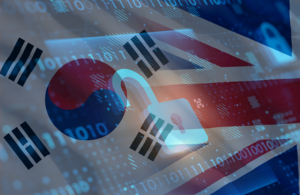UK finalises landmark data decision with South Korea to help unlock millions in economic growth
UK organisations will be able to share personal data securely with the Republic of Korea before the end of the year as the UK finalises legislation for its first independent adequacy decision.

UK and Republic of Korea flag with tech abstract picture over the top.
-
Organisations will be able to transfer personal data securely to the Republic of Korea without restrictions by the end of the year following legislation
-
UK decision will help generate an estimated £14.8 million in annual business savings and increased exports
-
Milestone formalises first data adequacy decision since UK left the European Union and goes beyond scope of previous EU deal - boosting investment.
UK organisations will be able to share personal data securely with the Republic of Korea before the end of the year as the UK finalises legislation for its first independent adequacy decision.
Allowing businesses in both countries to share data without restrictions will make it easier for them to operate and grow. Once in force, the legislation is estimated to cut administrative and financial burdens for UK businesses by £11 million a year and is expected to increase exports to South Korea by £3.8 million annually.
Personal data is information related to an individual, such as a name or email address, and data must be protected to a high standard to ensure it’s collected, shared and used in a trustworthy way.
After agreeing to a data adequacy agreement in principle in July 2022, the UK government has completed its full assessment of the Republic of Korea’s personal data legislation. The government has concluded that the Republic of Korea has strong privacy laws in place which will protect data transfers to South Korea while upholding the rights and protections of UK citizens.
Before now, organisations needed to have costly and time-consuming contractual safeguards in place, such as standard data protection clauses and Binding Corporate Rules. The new freedoms will open up opportunities for many small and medium sized businesses who may have avoided international data transfers to Korea due to these burdens.
Removing barriers to data transfers will also boost research and innovation by making it easier for experts to collaborate on medical treatments and other vital research which could save lives in the UK. For example, secure international personal data transfers are essential for developing effective medical treatments like vaccines.
UK Data Minister Julia Lopez met with representatives of the Korean Personal Information Protection Commission today to mark the legislation being laid in Parliament, which is expected to come into force from the 19th December.
This is the UK’s first decision to recognise a priority country adequate since leaving the European Union (EU).
The UK’s adequacy decision is broader than the EU’s deal with South Korea. The most significant difference between the two deals is that UK organisations will be able to share personal data related to credit information with the Republic of Korea to help identify customers and verify payments. The ability to share this type of data will help UK businesses with a presence in the Republic of Korea to boost credit, lending, investment and insurance operations in the Republic of Korea.
Data Minister Julia Lopez said:
“ Before the end of the year, businesses will be able to share data freely with the Republic of Korea - safe in the knowledge it will be protected to the high privacy standards we expect in the UK.
“ Removing unnecessary burdens on businesses will help unleash innovation, drive growth and improve lives across both our countries.”
Ko Haksoo Chairperson of the Korean Personal Information Protection Commission said:
“ It’s a great pleasure for us to see the outcome of the UK’s adequacy decision for the Republic of Korea today.
“ I look forward to strengthening our partnership in promoting the trustworthy use and exchange of data between Korea and the UK based on a high level of data protection.”
The Republic of Korea is one of the fastest growing markets for the UK, with more than two-thirds of British services exports to the country data-enabled.
John Edwards, UK Information Commissioner, said:
“ We support the Government in undertaking adequacy assessments to enable personal data to flow freely to trusted partners around the world.
“ We provided advice to the Government during this assessment of the Republic of Korea, and we are satisfied with the Government’s recognition of similar data protection rights and protection in Korean laws. This will bring certainty to UK businesses and reduce the burden of compliance, while ensuring people’s data is handled responsibly.”
Ends
Notes to Editors:
-
Please see here the Statutory Instrument (legislation) that will give effect to the UK’s adequacy decision for the Republic of Korea, is expected to come into effect on the 19th December.
-
Please see here the Explanatory Memorandum sets out the purpose of the Statutory Instrument.
-
Please see here the Impact Assessmentwhich sets out the objectives of the costs, benefits and risks.
-
In August 2021, the UK announced the Republic of Korea as a priority country for data adequacy assessments alongside the United States, Australia, Singapore, the Dubai International Finance Centre and Colombia. The government continues to make excellent progress in its assessment of these other priority countries.
-
Data enabled services exports to these destinations are already worth more than £80 billion. The ability to unlock more growth and allow us to share crucial information, such as life-saving research and cutting-edge technology innovation across our borders.
-
DCMS sectors, like tech, telecoms and the creative industries, contributed £211 billion to the economy last year and support more than four million jobs across the UK. And they are creating new jobs, with 250,000 more jobs now than in 2019, before the pandemic.
-
Exports of services by the digital sector were worth £56 billion in 2020, which is around a fifth of the UK’s total service exports.